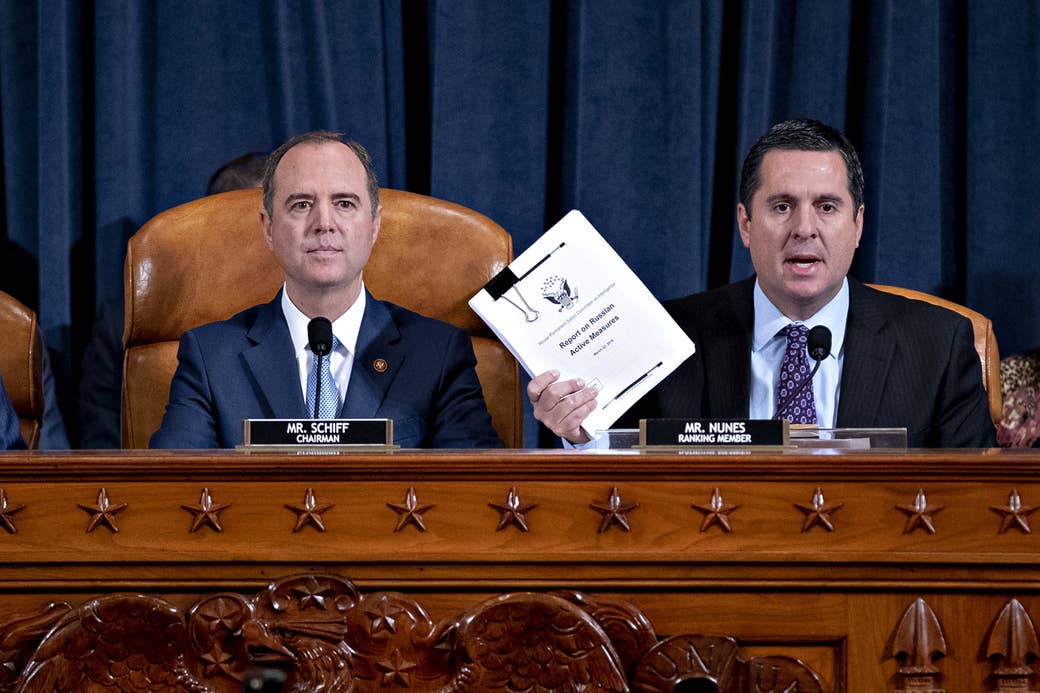
Editors' note: This story has been updated to more clearly attribute phrasing from work previously published in the Associated Press and OneZero.
On Thursday, you’ll likely sit down with your loved ones to share a big Thanksgiving meal. It’s a day about coming together with those closest to you, eating lots of food, and taking stock of what’s most important in life. As you’re passing the gravy boat around the table, everyone will probably agree not to talk about politics. Someone will say that things have been so crazy these last few months. Let’s just relax.
This, of course, will not happen.
Maybe one or two glasses of wine into the meal, someone will bring up the impeachment and you will most likely find yourself trying to explain why something one of your aunts or uncles saw on Fox News recently is actually total bullshit. You will talk in circles as the boomers in the room refuse to admit their brains have been melted by Facebook chain letters. Chances are they will confidently talk about stuff related to the impeachment that you have never even heard of before and honestly don’t even know where to go to begin learning about it. Well, look no further. Here’s your Trump world SparkNotes. Good luck out there.
“Ukraine — not Russia — meddled in the 2016 election.”

This is the central conspiracy at the heart of the impeachment. It’s the nucleus everything else revolves around. Republican President Donald Trump has been pushing some form of this since his inauguration. He brought it up as recently as last weekend in a Fox News interview. Nearly every pro-Trump media outlet over the last three years has riffed off this. It has evolved into unquestionable fact on right-wing social media.
It also goes against everything we know about the 2016 election interference.
Twelve Russian nationals were indicted last year as part of former special counsel Robert Mueller's investigation into Russian election interference. They were accused of a “sustained effort" to hack the Democratic National Committee’s email servers. All 12 are members of Russia’s military intelligence agency, the GRU, and believed to be those behind the "Guccifer 2.0" hacker persona that took credit for the 2016 hack. According to testimony last week from Fiona Hill, the National Security Council’s former senior director for Europe and Russia, the idea that Ukraine attempted anything nefarious is “a fictional narrative” that likely originated from a Russian disinformation campaign designed to destabilize Ukraine’s relationship with the United States.
“Where’s the missing server?”

Trump is alleged to have asked Ukraine’s President Volodymyr Zelensky about a “server" in their July phone call, according to the staff-written memorandum of the conversation. The idea of a missing physical server says more about Trump’s weak understanding of computers than anything else.
Trump most likely means the DNC servers that Russia breached in 2016. He seems to think these are physical computers located somewhere in the US, the way that Secretary of State Hillary Clinton had a server in her New York state home. Except the DNC had 140 servers, most of which were cloud-based, which means that there wouldn’t be a missing physical server. Most of their network was decommissioned in June 2016 after the GRU-led breach was discovered. And FBI agents weren’t given the DNC’s physical desktop computers because they didn’t need them. The investigators captured the evidence via a process called “imaging,” in which hard drives are copied. The entire process was both standard practice within the digital security industry and follows the protocol outlined in the Department of Justice’s electronic evidence manual.
“Ukrainians run CrowdStrike.”

CrowdStrike is a cybersecurity firm that works with clients like Goldman Sachs and Rackspace. What it is not is a Ukrainian company. The company’s headquarters is in Sunnyvale, California. California is a state located in the United States. Its cofounder and CTO, Dmitri Alperovitch, is a Russian-born American citizen.
That hasn’t stopped it from becoming another one of President Trump’s favorite talking points. He first brought it up in a 2017 interview with the AP and also mentioned it in his Fox News interview over the weekend, in which he said, “[Ukraine has] the server, right? From the DNC ... they gave the server to CrowdStrike — or whatever it’s called — which is a company owned by a very wealthy Ukrainian, and I still want to see that server. You know, the FBI has never gotten that server. That’s a big part of this whole thing. Why did they give it to a Ukrainian company?”
This particular conspiracy originated on message boards like 4chan and Reddit in early 2017, and may have been pushed by a Russian misinformation campaign. Alperovitch has worked with the Atlantic Council — a pro-NATO think tank. Victor Pinchuk, a Ukrainian oligarch and friend of the Clintons, is a member of the Atlantic Council’s International Advisory Board. Like a game of telephone, the fact that Alperovitch is a Russian American and Pinchuk is Ukrainian mutated together into one false theory that CrowdStrike is run out of Ukraine. It isn’t.
“CrowdStrike helped the DNC frame Russia.”

After the DNC hired CrowdStrike to investigate the breach, it released a report in December 2016 concluding that Russian government–backed hackers compromised the network. Pro-Trump news sites went on the offensive. Breitbart, in particular, devoted a considerable amount of resources into trying to poke holes into the security firm’s findings. They reported on CrowdStrike’s funding from Google, attacked the firm’s credibility, and accused Rep. Adam Schiff, then the ranking Democrat on the House Intelligence Committee, of working with CrowdStrike to spread conspiracy theories meant to discredit Trump’s presidential win. You’ll notice that none of this actually addresses the truth of the report.
“The FBI and Obama spied on the Trump campaign.”

The term “Spygate" comes from a Trump tweet on May 23, 2018, in which he accused the FBI and the Obama administration of spying on his 2016 campaign. This is based off a New York Times report that the FBI sent an informant to meet with former Trump campaign staffer George Papadopoulos to investigate Russian collusion. As Papadopoulos tells it, Maltese professor Joseph Mifsud met him in London in 2016 and promised Russian-sourced information about Clinton, the Democratic nominee for president, that could damage her campaign. Then, a few days later, Papadopoulos told Alexander Downer, an Australian diplomat based in London, that the Russian government had “dirt” on Clinton. Mifsud, it should be noted, was said in the Mueller report to have “connections to Russia” and was described by former FBI director James Comey as a “Russian agent.”
There is very little hard evidence that the Democrats or the FBI were spying on Trump’s campaign. A Foreign Intelligence Surveillance Act (FISA) warrant was issued in 2017 to collect the electronic communications of the Trump campaign’s junior foreign policy aide Carter Page, but the DOJ and the FBI have defended it as part of the investigation into Russian election meddling.
Papadopoulos eventually served 12 days in federal prison and is currently on a 12-month supervised release after pleading guilty to making false statements to FBI agents.
“Alexandra Chalupa colluded with the Ukrainian Embassy.”

A 2017 story in Politico into possible Ukrainian attempts to influence the 2016 US presidential election was submitted last week to the congressional record. Written by Ken Vogel and Ukraine-based reporter David Stern, the story continues to go viral within pro-Trump Facebook groups and among prominent Republicans. Alina Polyakova, a director and fellow at the Brookings Institute, told BuzzFeed News that the Politico piece was likely the beginning of the Ukrainian collusion narrative. “To me, this is the origin story of that narrative,” she said.
In the Politico piece, a 29-year-old former diplomat named Andriy Telizhenko accused Oksana Shulyar, an aide to Valeriy Chaly, the Ukrainian ambassador to the US, of asking Telizhenko in 2016 to help Ukrainian American DNC contractor Alexandra Chalupa research connections between Trump, his campaign chair Paul Manafort, and the Russian government.
Telizhenko has been interviewed by Rudy Giuliani, a lawyer working for Trump; met with Wisconsin Republican Sen. Ron Johnson; and been named in testimony by US Ambassador to the European Union Gordon Sondland and Bill Taylor, currently the top US diplomat in Ukraine. Still, it’s literally his word against everyone else’s. Both the Ukrainian Embassy and Chalupa dispute Telizhenko’s version of events.
“John Solomon proved there was Ukrainian collusion.”

Conservative journalist John Solomon’s work earlier this year for DC-based news outlet the Hill is regularly cited by Trump supporters as proof of Ukrainian interference. But although Solomon’s reporting on Ukraine has rattled his former colleagues (the paper has put them under review), it has nevertheless shaped many of the pro-Trump conspiracies. Solomon, who left the site for Fox News in September, alleged that Ukrainian law enforcement had evidence that Democrats attempted to interfere in the 2016 election.
Ukrainian prosecutors like Yuriy Lutsenko and Kostiantyn Kulyk coming forward with tales of Ukrainian election meddling have likely been part of a larger plan to curry favor with Trump’s inner circle and oust Marie Yovanovitch, a vocal anti-corruption critic who was the US ambassador to Ukraine. The Trump administration recalled Yovanovitch in May.
As Ukrainian prosecutors were talking to right-wing American media, a group of business associates and Republican donors connected to Giuliani and Trump were working to "install new management at the top of Ukraine’s massive state gas company," Naftogaz, according to an investigation by the Associated Press. A group of Americans — including Energy Secretary Rick Perry — spent March through May trying to install new leadership at Naftogaz in hopes to "steer lucrative contracts to companies controlled by Trump" allies. Yovanovitch’s ouster was a key part of that plan, according to the Associated Press.
“The Democrats are breaking impeachment rules.”

At some point during each impeachment hearing, Republican Rep. Devin Nunes, the House Intelligence Committee’s vice chair, would complain that Democrats were collecting secret depositions in a basement of the Capitol building “like some kind of strange cult.” Fox News has accused the Democrats of unfairly ignoring due process.
The only problem with that claim is that Democrats didn’t make the House rules — Republicans did, back in 2015 when they were the majority party. So far Democrat Rep. Adam Schiff, chair of the Intelligence Committee, has followed them.
The rules were signed by former House speaker John Boehner in January 2015 when the Republicans held the majority. According to those rules, initial interviews of witnesses can be held in private and then provide testimony publicly in televised hearings.
“We all know who the whistleblower is.”

The president’s son Donald Trump Jr. and other prominent Republicans like Sen. Rand Paul, Rep. Matt Gaetz, and Rep. Steve King have all publicly shared either the name or picture of a CIA officer whom right-wing media and pro-Trump message boards have accused of being the Trump whistleblower.
Stories featuring the CIA officer’s name and face have gone viral on Facebook, despite the platform telling BuzzFeed News earlier this month that it would be blocking the name. BuzzFeed News does not know the identity of the whistleblower. The New York Times reported that the whistleblower is a CIA officer previously detailed to the White House with expertise on Ukraine. The lack of any sort of real evidence that the CIA officer is the whistleblower hasn’t stopped Trump supporters from spreading his personal information across the internet and threatening violence against him.
“The head of Burisma was indicted over money laundering related to the Bidens.”

This bit of misinformation started to spread during last Wednesday’s impeachment hearing. It originates from the pro-Trump blog ZeroHedge, which claimed Mykola Zlochevsky, the head of Burisma, the Ukrainian energy company on which Hunter Biden was on the board of directors, was indicted in Ukraine over money laundering. ZeroHedge’s story linked to a story published on Interfax-Ukraine.
But the Interfax story never mentions an indictment. It looks like ZeroHedge mistranslated it. The story actually described Ukrainian parliament members demanding an investigation into Zlochevsky and former president Viktor Yanukovych. While Burisma's founder has long faced scrutiny, Ukraine’s chief prosecutor, Ruslan Ryaboshapka, has confirmed there was no investigation into the Bidens by his office. Any alleged corruption by Zlochevsky doesn't touch on Hunter Biden's former seat on the Ukrainian energy company's board. The fact that the indictment claim was completely baseless, though, hasn’t stopped the story from going extremely viral on Facebook.
“No one is watching the impeachment.”

There’s a good chance you’ve heard this a lot over the last month. Nunes and other Republicans on the House Intelligence Committee regularly repeat that the ratings for the televised impeachment hearings are in the toilet. “TV ratings are way down. Way down. I don’t hold it personally. But whatever drug deal the Democrats are cooking up here on the dais, the American people aren’t buying,” Nunes said on Tuesday.
This isn’t true. The ratings are lower than they were for 1973 Senate Watergate hearings, but the way Americans consume the news has changed dramatically in the last 40 years. The Trump impeachment hearings are livestreamed across multiple internet platforms, which makes measuring their viewership difficult. Last week, Fox News had its highest-rated week of the year with an average total daily audience of 1.697 million viewers, and its best ratings since last year’s midterms. Trailing behind Fox were MSNBC (1.294 million) and CNN (823,000). But impeachment content on Facebook is regularly driving millions of interactions on the platform. Yovanovitch’s Nov. 15 testimony appears to have been the peak with 6 million interactions, according to data from NewsWhip.
OK, here’s one for your MAGA uncle: “Russian trolls turned people into Trump voters.”

Although conspiracy theories surrounding the impeachment and the 2016 election are dramatically overrepresented on the American right, there are a few that circulate on the left as well. This is probably the most prominent one.
While, yes, Russia’s GRU did attempt to disrupt our election, and while much of their strategy involved using sock puppet accounts on social media platforms like Facebook, Twitter, Instagram, and Tumblr, based on newly published research, it’s likely the disinformation campaign didn’t actually change anyone’s mind.
Last year, Twitter publicly identified 3,814 Russia-controlled Twitter accounts. In the 10 weeks leading up to the 2016 election, these accounts posted approximately 175,993 tweets, 84% of which was political content. According to Mueller’s report on Russian interference, tweets by Russia’s Internet Research Agency tweets were quoted extensively in US news outlets. Seventy US outlets were found to have quoted a Russian-controlled Twitter account and attributed it to a real person.
But all of that said, a new study reported by OneZero, "led by researchers from Duke University and published on Monday in the Proceedings of the National Academy of Sciences" found that, based on surveys of Twitter users’ political attitudes taken in October and November 2017, the accounts that did interact with IRA-controlled accounts showed little to no change in political opinion or engagement.
So, you know, maybe everyone just needs to shut up and have some more stuffing.
CLARIFICATION
This story has been updated to better explain Interfax-Ukraine's reporting and to clarify allegations against Mykola Zlochevsky.
